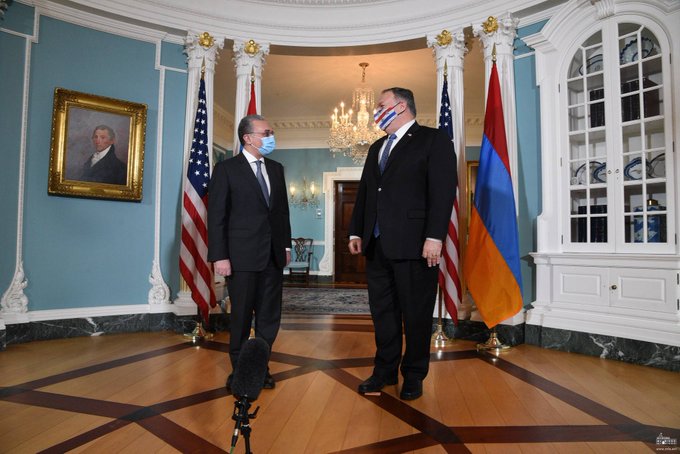
Armenia and Azerbaijan have agreed to another humanitarian ceasefire agreement, which is scheduled to go into effect at 8 a.m. local time. This is the third ceasefire agreement since Azerbaijan launched its attacks on Artsakh on September 27—exactly four weeks ago.
Previous attempts were led by Russia and France. Sunday’s announcement from the US State Department came after talks with US Secretary of State Michael Pompeo and Deputy Secretary of State Stephen E. Beigun. Negotiations continued in Washington, DC over the weekend in joint meetings with Armenian Foreign Minister Zohrab Mnatsakanyan, his Azerbaijan counterpart Jeyhun Bayramov and the co-chairs of the OSCE Minsk Group, namely Igor Popov of the Russian Federation, Stephanie Visconti of France and Andrew Schofer of the US among others. A statement issued by the US State Department recalled similar terms set forth from previous agreements: implementing an immediate humanitarian ceasefire, monitoring the ceasefire within certain parameters and finding a “comprehensive solution.” The co-chairs and foreign ministers will be meeting in Geneva on Thursday to discuss further steps to achieve a peaceful settlement of the Nagorno-Karabakh conflict.
Sunday’s unexpected announcement was reached hours after US President Donald Trump’s reference to Armenians during a rally in New Hampshire. “They are fighting like hell,” said President Trump to loud cheers from a large group of Diasporan Armenians from the eastern region. “We’ll get that straightened out,” he continued in his description of an “easy” problem to fix.
Congratulations to Armenian Prime Minister Nikol Pashinyan and Azerbaijani President Ilham Aliyev, who just agreed to adhere to a cease fire effective at midnight. Many lives will be saved. Proud of my team @SecPompeo & Steve Biegun & @WHNSC for getting the deal done!
— Donald J. Trump (@realDonaldTrump) October 25, 2020
Turkish President Recep Tayyip Erdogan, for his part, is threatening the US over possible sanctions amid its alliance with Azerbaijan and military support and involvement in this conflict. During his address in Malatya on Sunday, Erdogan said, “We have been accused just because we stand by our Azerbaijani brothers and sisters who defend their own lands in the Caucasus. You don’t know who you are dealing with. Whatever your sanctions are, don’t be late to impose them.” Late last week, Erdogan told reporters that Turkey is testing its Russian acquired S-400 missile defense system, which was immediately condemned by US defense officials. Turkey’s acquisition of this defense system led to its suspension from the F-35 program by the Trump administration back in 2019.
Meanwhile on the battlefield, Armenian military officials say attacks in the northern direction were not as intense as those coming from the south. Armenia’s Armed Forces had to also contend with subversive groups seen in a number of villages north of Hadrut and south of Martuni. “Usually the subversive groups do not fight. They try to run away if they are discovered by our armed forces,” said Ministry of Defense representative Artsrun Hovhannisyan during his evening press briefing. Hovhannisyan concluded his brief remarks by referring to Erdogan’s comments and underscoring this existential threat to the Armenian nation. He said, “Victory for us means our security. Victory for us means not allowing a second genocide. The war for our existence continues.”



Be the first to comment